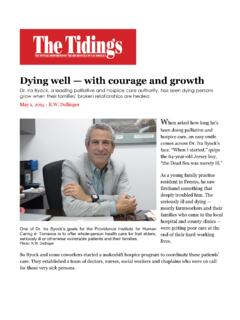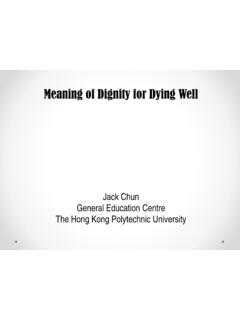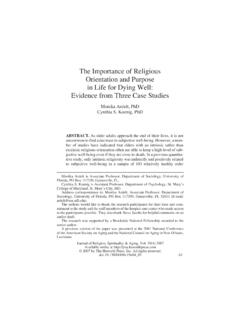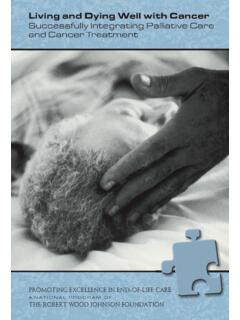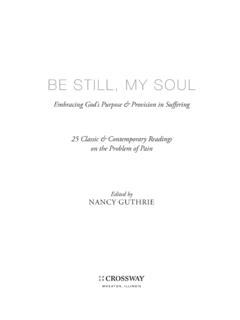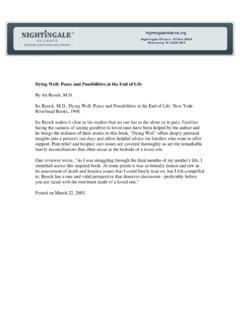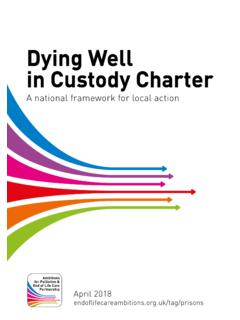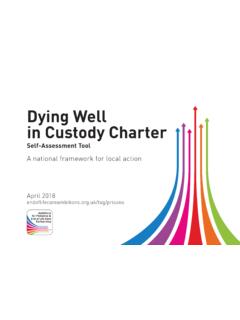Transcription of Dying Well: The Prospect for Growth at the End of Life
1 Dying well : The Prospect for Growth at the End of Life by Ira Byock, MD Prepared by: Rev. Debra S. Hayden Spiritual & Bereavement Care Provider Hospice of Visiting Nurse Service Akron, Ohio Ira Byock, MD Executive Director and Chief Medical Officer Institute for Human Caring Providence Health and Services Torrance, CA How to Use This Guide This discussion guide was developed so that Dr. Byock s book, Dying well could be used for study by book clubs and classes. Each session is designed for 1-1/2 hours of discussion. Participants should read the suggested chapters of Dr. Byock s book for each session prior to each session. The questions brought forth in this guide are by no means exhaustive and time should be allotted at the end of each session to discuss any other issues that caused the participants pause as they read the material for each session.
2 This guide is only a jumping off point for, hopefully, valuable and meaningful discussion on the subject of Dying well and what that means for each individual. It has been my hope that the sharing of views and concerns each time you meet, might dispel some myths surrounding death and Dying and cause the participants to open their minds to the possibilities that lie ahead for all of us. For there is one certainty that is universal for all of humanity, and all of creation. That is, that eventually we all will die. But how we go about Dying and how we attend to the Dying , is still an open-ended venture. CONTENTS Session One: Chapter One - Teaching About Living, Teaching About Dying Session Two: Chapter Two - Questioning Assumptions and Dawning Awareness: My Journey Session Three: Chapter Three - Learning to Die well : Anne-Marie Wilson Session Four: Chapter Four - "Suffering and Beyond: Douglas Kennedy" Session Five: Chapter Five - "Finding Dignity Amid Disease and Disintegration: Wallace Burke, Julia Rosauer, Hap Vischer" Session Six: Chapter Six - "The Hardest Decision and the Greatest Opportunities: Janelle Haldeman" Sessions Seven and Eight: Chapters Seven and Eight - "Writing a Personal Script for Dying : Steve Morris" & - "Accepting the Gift of Dependence and the Burden of Care.
3 Jake Edwards" Session Nine and Ten: Chapters Nine and Ten - "Growing with Tragedy: Michael Merseal" & -"Facing Unbearable Pain, Unspeakable Losses: Terry Matthews" Session Eleven: Chapter Eleven - "Letting Go, Growing On: Maureen Riley" Session Twelve: Chapter Twelve - "Getting There From Here: Social and Cultural Dimensions" Session One Chapter One - Teaching About Living, Teaching About Dying 1. Is there anything about Dr. Byock s personal story that sounds familiar to you? 2. Take time to tell personal stories of your own that taught you about Dying . What were the hard lessons that your experience taught you? 3. Did your experience change your views about living with Dying ? 4. If you could do things differently, what things would you have changed?
4 5. What did you do that you were glad that you did? Session Two Chapter Two - Questioning Assumptions and Dawning Awareness: My Journey It might be helpful for this session to have an attorney or social worker speak briefly to the class about Living Wills, Advanced Directives and the Durable Power of Attorney for Health Care. Have copies available for anyone who would like copies. 1. In the second paragraph of this chapter, Dr. Byock states: the time of my father s Dying , especially the last months and weeks, pervaded my thoughts and permeated my dreams. The memories were full of compelling images and poignant vignettes that connected me with a deep, aching sadness. Something about that time was also undeniably precious. ( ) Have you had an experience similar to his?
5 Share your experiences. What makes them so poignant? What makes these images and memories precious? 2. As Dr. Byock recalled his experience with death on a hospital unit, he asked the question, I wondered what it was permissible to die from. (p. 27) What do you think he is asking? 3. In your experience, are there more acceptable reasons for Dying compared to others? Are there reasons for death that you are more comfortable with than others? 4. Have you discussed your final wishes to those who are close to you? If not, why? 5. What does the expression " Dying well " mean to you? What would be a "good death" for you when that time comes? Session Three Chapter 3 - Learning to Die well : Anne-Marie Wilson Dr. Byock states in this chapter: "Medical training is not very helpful for understanding the personal, as opposed to the medical, nature of Dying .
6 " (p. 35) 1. What do you think he means by a personal nature of Dying verses a medical nature of Dying ? 2. Has it been your experience that his statement is true regarding medical training? Why or why not? 3. What feelings did you have as you read about Anne-Marie's approach and experience with Dying ? 4. How was the human dimension of Dying made available to Anne-Marie? Session Four Chapter Four - "Suffering and Beyond: Douglas Kennedy" 1. Dr. Byock believes that two kinds of suffering are universally present in the Dying , physical suffering and emotional/psychological suffering. Discuss your own experiences with this. 2. What are your beliefs about suffering? Where do they come from? 3. Dr. Byock states in this chapter that "Pain and privation can be endured if it is for a purpose.
7 " (p. 83) Do you agree? Why or why not? 4. What was your reaction to Dr. Byock admitting Douglas to a psychiatric unit? Session Five Chapter Five - "Finding Dignity Amid Disease and Disintegration: Wallace Burke, Julia Rosauer, Hap Vischer" 1. Discuss your views on what gives our life dignity? 2. How does Dr. Byock define dignity? Do you agree with his definition? Why or why not? 3. Talk about how do you think you would feel if you were completely dependent on the care of others. 4. Discuss your reaction to Wallace's decision to stop eating? Would you do the same thing if you were in his situation? Session Six Chapter Six - "The Hardest Decision and the Greatest Opportunities: Janelle Haldeman" 1. Have you had the experience of being able to reconcile with someone before they died?
8 What was that like for you and how did you know the time was right to do so? 2. Have you ever been in the position of asking yourself the question "Did I do the right thing?" following the death of someone who you were involved in decisions regarding their care? What was your answer? Was there anything you regretted? What were you most at peace with? 3. Do you agree with Dr. Byock's assessment that Janelle's body was "searching for a way to die"? (p. 135) Have you seen this before in those that you cared about who were Dying ? 4. How did you feel when it was decided to cease all food and hydration for Janelle? Have you had to make this decision for someone that you loved? What was that like? Sessions Seven and Eight Chapters Seven and Eight - "Writing a Personal Script for Dying : Steve Morris" & "Accepting the Gift of Dependence and the Burden of Care: Jake Edwards" Have written on newsprint or board before the session the "Five Things of Relationship Completion: "I forgive you"; "Forgive me"; "Thank you"; "I love you"; "Goodbye" 1.
9 How difficult would it be for you to recite the "five things of relationship completion" with someone that you love who is Dying ? What would prevent you from doing so? (p. 140) 2. Have you had an opportunity to do this? Share your experience with the class if you feel comfortable doing so. 3. Dr. Byock states in Chapter Seven: "One key to living well lies in expressing the essence of 'the five things' in our daily interactions with those we love." (p. 158) He seems to be suggesting that we don't have to wait until someone is Dying to go about the business of "relationship completion". Have the class write down on a piece of paper the following: A person or persons they need to forgive. A person or persons from which they need to ask for forgiveness.
10 A person or persons to which they need to say "thank you". A person or persons to which they need to say "I love you." Someone that they might know who is Dying that they need to say all of the above as well as "Goodbye". 4. Why do you think it might be important to those left behind to be able to feel that their relationship to the person who has died is completed before they died? 5. Do you have a relationship that you were unable to complete before they died? What has that been like for you? 6. Talk about possible ways to complete a relationship even though the person has died. Session Nine Chapters Nine and Ten - "Growing with Tragedy: Michael Merseal" & "Facing Unbearable Pain, Unspeakable Losses: Terry Matthews" 1. Once again, in the story of Michael, we are faced with the decision to cease food and hydration, except this time it is with a small child.
